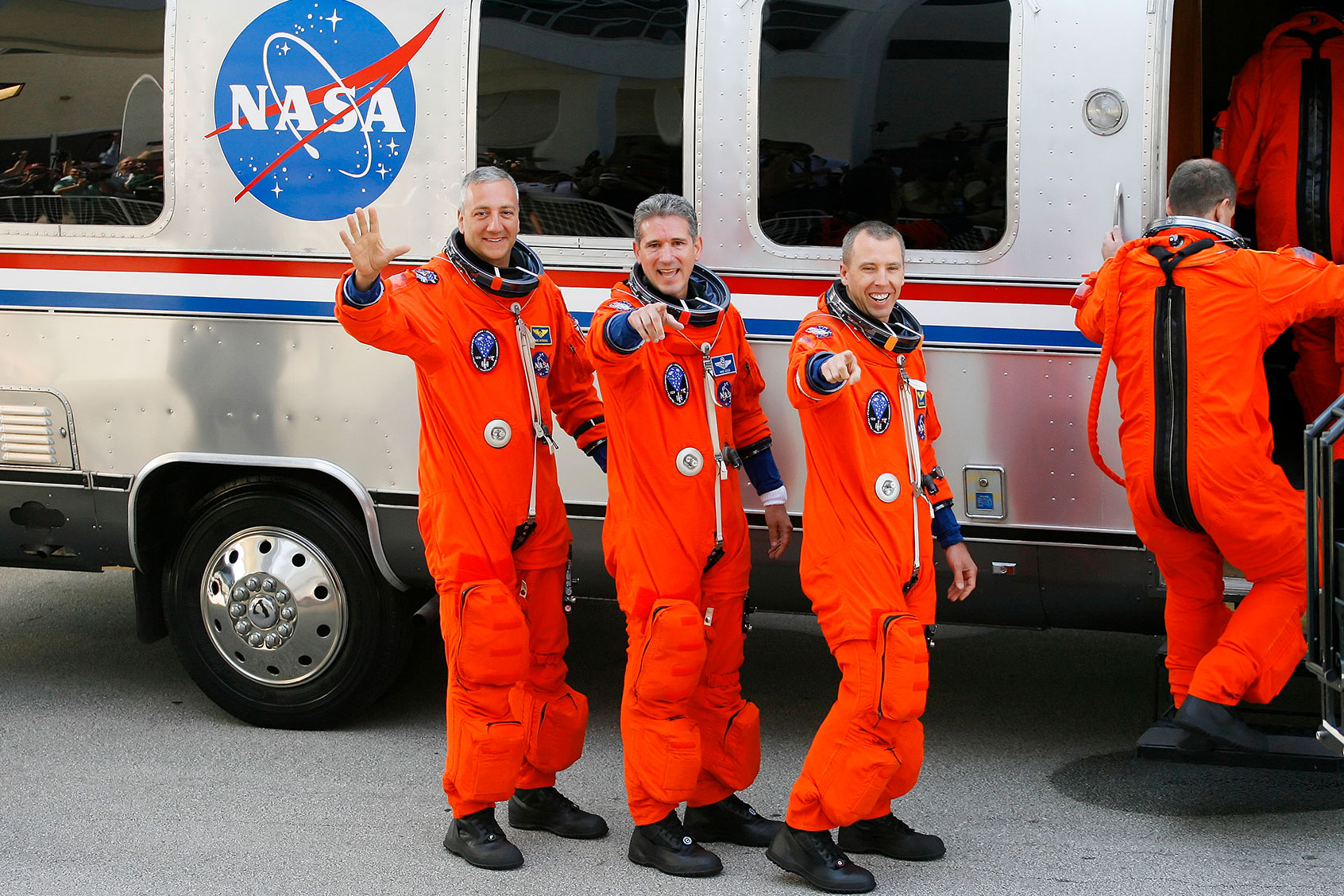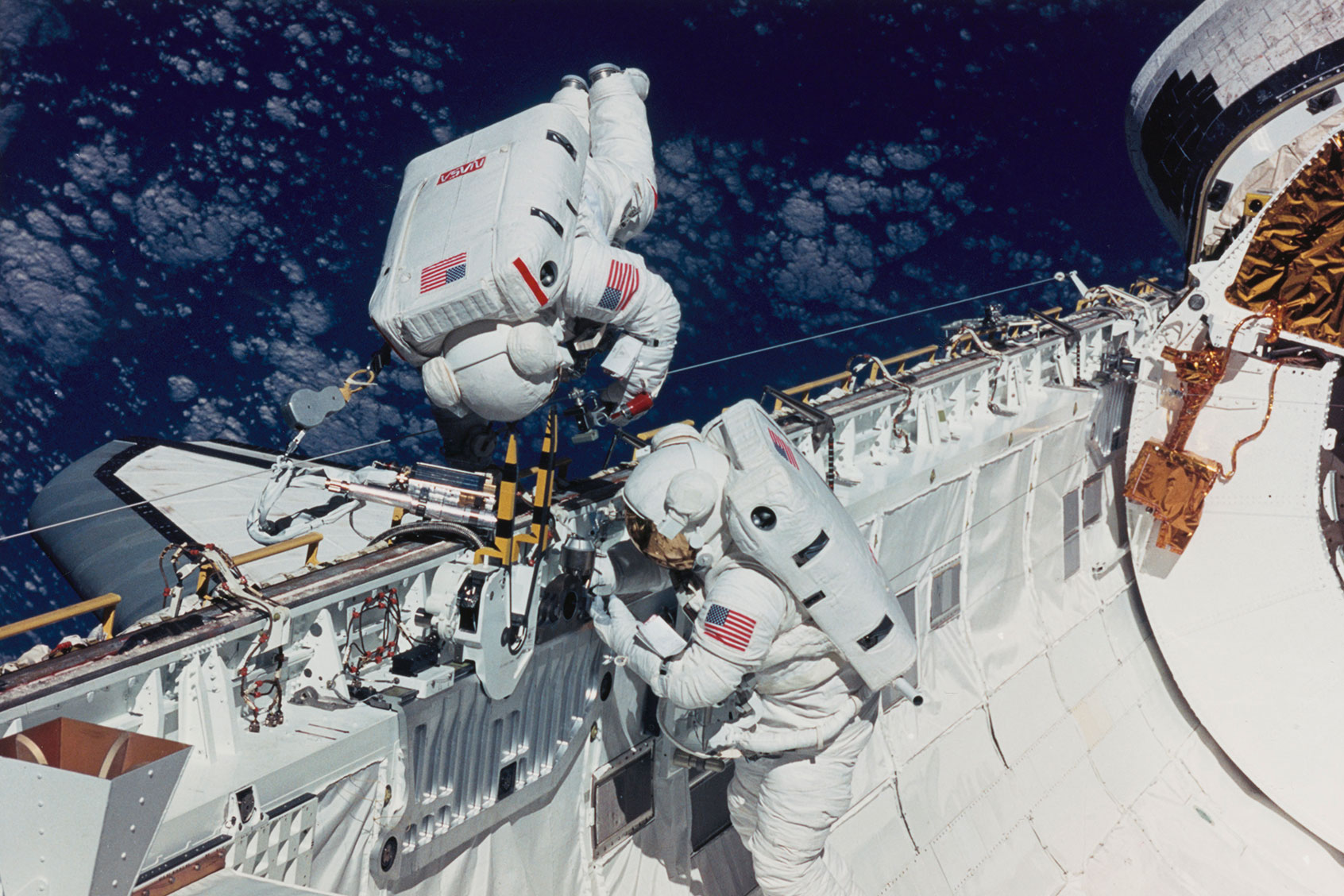On the big day, I departed the airlock with my partner, Mike Good, “Bueno.” The thought in my mind was that I wanted a perfect day. Have you ever had a perfect day at work? No problems, no issues, just clear sailing? I wanted one of those, and the day of spacewalking started out very well. We were trained as well as any crew had ever been trained for a Hubble space walk, and our teams on the ground in Houston and at Goddard were fully prepared and watching closely. Everything went smoothly for the first hour or so. We were even ahead of schedule. A perfect day in the making.
Then came time to remove the handrail. We went to the checklist: “Remove handrail bolts, four.” Easy. I grabbed my power tool and went to work. The two bolts at the top came out easily, as did the one on the lower left. But the one on the lower right gave me trouble. For some reason, my power tool was just spinning and spinning. “C’mon,” I thought, “I’ve got more important things to do today.” But it just kept spinning and, after a few more moments, I thought I better take a closer look at what was going on.
The bolt was low, outside of my field of view, and I had poor visibility due to the size of my helmet and the poor lighting. So I got out of my foot restraint and moved downward to take a closer look. When I did, I saw what I’d done: I’d stripped the bolt head. No longer a pristine hex shape, it was now gnarled up and unusable.
At that moment, a cascade of realizations washed over me: that bolt wasn’t coming out, which meant the handrail wasn’t coming off, which meant the 111 small screws weren’t coming out, which meant STIS [Space Telescope Imaging Spectrograph] wasn’t coming back to life, which meant that astronomers would never find life in the universe — and the entire world would blame me, forever, because it was all my fault.
Astronomers would never find life in the universe — and the entire world would blame me, forever, because it was all my fault.
I leaned back out of the telescope and looked down at Earth. We were over the Pacific Ocean, and as I gazed down at that magnificent body of water, I couldn’t imagine a hardware store where I could get any help. “How can anyone help me out of this one?” I thought. “All of my help is down there.” A deep sense of loneliness hit me. It was not a Saturday-afternoon-at-home-with-a-book kind of loneliness. It was more like a first-day-at-a-new-school-and-you-have-no-friends kind of loneliness. I felt separated from Earth, separated from the team that could help me. I knew the repair and STIS backward and forward, and I knew there was no solution to what I had done.
Within a matter of seconds, I knew it was time to confess what I had done, to tell the larger team what had happened. When I did, the voice I heard in my ear was Dan’s, perfectly calm and totally reassuring. “Okay, no problem,” he said. “We will see what we can do to help.”
For the next hour or so, we tried anything we could think of. Dan kept us busy, and he was the guy to do it. Meanwhile, back in Houston, Jim Corbo had stepped out of the discussion in the Hubble support back room for a moment to ponder the situation, eventually asking himself, “What would you do if you were in your garage?” Then he remembered that when fancy technology fails, brute force is often the best option. Since the handrail was free at the top and only one bolt remained at the bottom, why not just break it off?
 Space Shuttle Atlantis STS-125 astronauts (R-L) Andrew Feustel, Michael Good, and Mike Massimino pose for the media after walking out of the Operations and Checkout building at Kennedy Space Center May 11, 2009 in Cape Canaveral, Florida. (Eliot J. Schechter/Getty Images
Space Shuttle Atlantis STS-125 astronauts (R-L) Andrew Feustel, Michael Good, and Mike Massimino pose for the media after walking out of the Operations and Checkout building at Kennedy Space Center May 11, 2009 in Cape Canaveral, Florida. (Eliot J. Schechter/Getty Images
When faced with little hope, just about anything is worth considering.
Breaking the handrail off of the Hubble didn’t occur to me or my crewmates or anyone in the front room at MCC (Mission Control Center) because it’s something that we’d never trained to do or thought of doing in space. Breaking metal in space is typically a bad idea. It can create debris that might find its way inside the telescope and damage the optics. Or worse, it could fire back toward me or Bueno and damage our spacesuits. Still, when faced with little hope, just about anything is worth considering. And the clock was ticking. With the consumables in our suits slowly running down — meaning our oxygen, power and CO2 scrubbing — we couldn’t stay outside and troubleshoot forever. Even if we solved the handrail problem, we’d still need enough time to complete the repair, and we were already pushing those limits.
Jim Corbo called back to James Cooper at Goddard and relayed his idea. Then James called over to Jeff Rodin in Building 29. Jeff and his team came up with a quick plan after retrieving a similar handrail from a clean room at Goddard and setting it up in the same configuration we had on orbit: three screws out, loose at the top, one remaining screw on the bottom right of the handrail. They then pulled on the handrail’s free end with a fish scale. Right when the scale got to 60 pounds of force, the handrail snapped off and went flying.
Want more health and science stories in your inbox? Subscribe to Salon's weekly newsletter Lab Notes.
The first I heard about any of it came from Dan. “Mass,” he said, “I think we’ve got something.” I could tell he had something good to tell us by the excited yet confident tone of his voice. Then he told me and my crewmates what they were considering, just as if he was presenting a plan to rewire my kitchen — which, incidentally, he had also helped me with. Dan then laid it all out for me, explaining further that Bueno and I were to wrap the bottom of the handrail as best we could with Kapton tape, which would contain the debris that was sure to be generated during the break. I should give it a few tugs at the top to yield the bolt a bit, and the final force needed would be 60 pounds linear at the top of the handrail.
“Dan,” I said, “that sounds like a good idea.”
With Bueno’s help, I taped the handrail as best I could. We were like two Boy Scouts tying knots together. Then we reported back that we were ready. At that moment, even though Dan was a world away, I felt like he was right there with me, just like when we were working in my garage.
“Okay,” I said, “here we go.”
I gave the handrail a couple yanks until I felt the bolt start to yield. Then I gave it one last good pull and . . . it broke off! “It’s off!” I exclaimed, before adding more calmly, “Disposal bag please.” The bag was needed to stow the handrail for its journey back to Earth. Bueno was more than happy to present the bag, take the handrail and stow it away for safe keeping now that it was no longer an obstacle to our success that day. I was so grateful for a second chance.
Dan then came over the radio again. “That’s great news,” he said. “Back to our regularly scheduled programming.”
The rest of the repair went well, and my buddy was there each step of the way. I could tell he was so happy that we came up with a solution and that we could now continue. I was extra careful not to break anything else, STIS was brought back to life and Hubble was free to unlock more mysteries of the universe.
– – –
Not everyone gets to go to space, but we all have times in our lives when we can feel as lonely and as isolated as it can feel out in orbit.
For astronauts, CAPCOM and MCC are always a call away. In our daily lives on Earth, we need to identify our own Houston, the people who can play that role for us and who we can assist in return. Be the person at work people can go to with that question that no one else can answer. Be the friend people can go to when they need a favor or just someone to talk to. Be the partner who can comfort your significant other when disappointment occurs. Be the parent your child can always come to with a big decision or problem. These are not easy things to do, but just as we need a CAPCOM to go to in times of need, others in our lives need us to do that for them.
We need your help to stay independent
Not everyone gets to go to space, but we all have times in our lives when we can feel as lonely and as isolated as it can feel out in orbit. We all have moments of feeling adrift and lost. So, if you find yourself in that situation, or if someone in your life is in that situation, here are the things to remember:
- You are not alone. Identify the person who can help you and reach out to them. Think of them as your Mission Control Center.
- When you suspect that someone in your professional or personal life might be going through a difficult time at work or at home, check in on them. Be their CAPCOM.
- Even when there’s no crisis, reach out to the people for whom you feel responsible. Get a status check on how they are doing. Let them know that you’re there for them if they ever need you, that you are, as we say in the space business, “standing by.”
- When anyone reaches out to you, be they a client, a coworker, or a loved one, let them know that they’re a priority, that they aren’t being an imposition. Reassure them that they are not alone in this problem and that you’ll stick by their side until you resolve it together.
Life is hard, but it gets a lot easier when you have a lifeline. Never be afraid to reach out to a friend or a coworker and say, “Houston, I have a problem.” But you don’t have to call them “Houston” if you think it might be weird.

